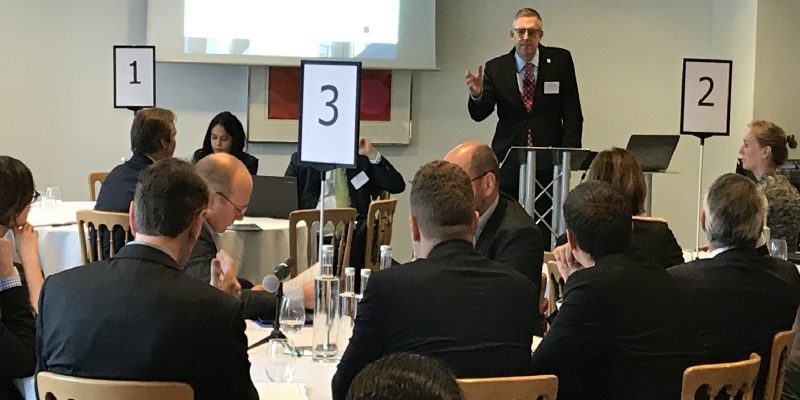There is a lot of positive buzz about blended finance — the practice of mobilizing private capital for public good — in policy and business circles around the world these days.
Last month, I joined MCC Chief Operating Officer (COO) Jonathan Nash and members of MCC’s Infrastructure, Environment and Private Sector team in London, Europe’s financial capital, to participate in a timely conference on blended finance hosted by commercial law firm Berwin Leighton Paisner LLP.

Photo credit: MCC
MCC Chief Operating Officer Jonathan Nash talks about how the public and private sectors can work together to mobilize private capital for public good — often called blended finance — at a conference hosted by international law firm Berwin Leighton Paisner on November 14 in London.
As MCC COO Nash told conference participants in his opening remarks, “Catalyzing private investment for development has been fundamental to MCC’s work since its founding 13 years ago.” “Blended finance is the future of development,” he said, “and by aligning business strategies with development priorities, we can strengthen outcomes to transform lives.”
Central to the MCC’s work is a continued focus on how to mobilize the capital, expertise and efficiency of the private sector to help partner country governments deliver faster, better, affordable services and generate sustainable development outcomes.
MCC’s efforts have already leveraged more than $6 billion in additional investments and commitments from the private sector and other development partners. Jordan offers a great example. There, MCC’s investment helped mobilize an additional $110 million from the private sector and $20 million from the Jordanian Government to expand the As-Samra Wastewater Treatment Plant, which treats 70 percent of the nation’s wastewater. The public-private partnership financing structure multiplied MCC’s investment impact and furthered the project’s sustainability. By investing in foundational work, including support for institutional and policy reforms, MCC is enabling partner country governments to better deliver critical goods and services to their people.
Blended finance is still relatively new, so generating awareness of the issues and starting off on the right foot is key. During the event, participants emphasized that governments should be wary not to crowd out private investment by using public funds for projects that the private sector is willing to finance on its own. They also stressed not to lose sight of a project’s development objective of helping those in need. MCC can — and does — use blended finance strategically to advance both development and private sector outcomes.
As the head of MCC’s Public Engagement Team, I have the pleasure of working with colleagues from across the agency to bring the private and public sectors together. We are always looking to work with businesses and investors in the United States, Europe and around the globe and share the incredible opportunities in our partner countries. We recently launched a new Work With Us section of our website to help us do just that — I hope you’ll take a look! I am proud to work at an agency at the forefront of blended finance. It is yet another tool to alleviate global poverty.

